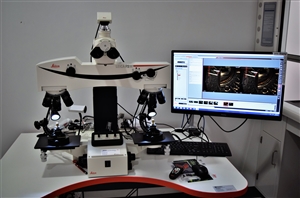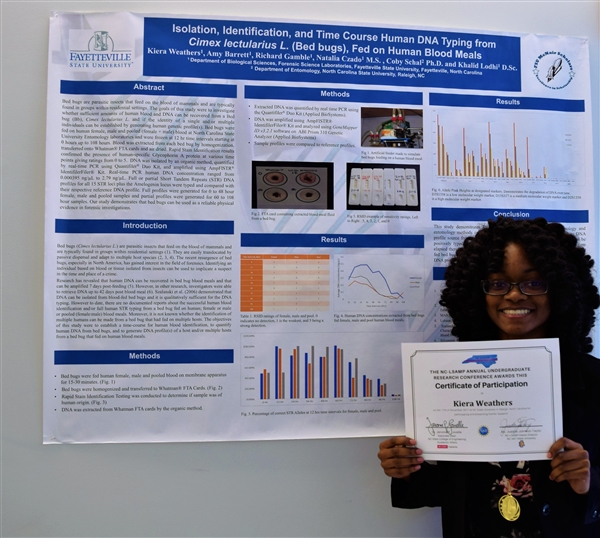Forensic Science Research
We highly encouraged you to participate in research as an undergraduate. Conducting research allows you to expand your interests, define your career goals, and network with other professionals. Research builds both hard and soft transferable skills that increases your competitiveness when seeking placement in forensic science positions or graduate programs.
Many of our students have co-authored peer-reviewed articles under the guidance of faculty and presented their research at local and regional conferences. They have collaborated with other universities and law enforcement agencies and built strong relationships with faculty members.
Carla Peguese
Forensic Laboratory Technician at the Wilmington Police Department Crime Lab
Lydia Hervey
Senior Forensic Science Student
Facilities
The Forensic Science Program has laboratories and instrumentation located in the Science and Technology Building. In addition, we have access to the instrumentation located in the University's Core Facility in the Lyons Science Annex and the electron microscopy instrumentation in the Lyons Science Building.
The Department of Biological Sciences at Fayetteville State University has provided the Forensic Science Program with many modern instruments and facilities that enable the students to gain the knowledge and skills needed in forensic science and the biotechnology. Here is a list of the major instruments available to students:
- Comparison Microscope
- Polarized Light Microscopes
- Phase Contrast Microscopes
- Differential Interference Microscopes
- Compound Microscopes
- Stereomicroscopes
- State-of-the-art Electron Microprobe
- Scanning Electron Microscope
- ABI 310 DNA Genetic Analyzer
- ABI 7500 Real-Time PCR Machine
- Thermal cyclers
- Gas Chromatograph/ Mass Spectrophotometer (GC/MS)
- High Performance Liquid Chromatography Instrument (HPLC)
- UV- Visible Spectrophotometers
PrOMiSS Grant
Under the direct guidance of a faculty member, you will spend 10 hours a week conducting research, and 5 hours tutoring for select STEM courses. In addition to receiving a stipend for your work, you will also be provided funding to present your research at conferences. In order to apply, you must be a junior or senior who has completed BIOL 150, BIOL 150L, CHEM 141, CHEM 142, CHEM 161, CHEM 162, PHYS 115, PHYS 116, MATH 129, and MATH 130 with a final letter grade of a B or higher, and be recommended by a faculty member. If selected, you will be required to attend a one-day personalized, on-site professional development workshop during the fall semester. Applications are accepted until all positions are filled.
McNair Scholars Program
This program assists students who wish to obtain their Ph.D. with research opportunities, GRE preparation, mentoring, etc. Please visit their website for more information.
North Carolina Louis Stokes Alliance for Minority Participation (NCLSAMP)
This program aims to assist students with completing STEM degrees and enrolling in graduate studies. For more information, please visit their website.
Several faculty members in the Forensic Science Program have presented their research at local, national, and international conferences:
Dr. Lieceng Zhu presented a poster entitled, "Research on wheat-hessian fly interaction at Fayetteville State University" at the "Entomology and Entomologists at Predominantly Undergraduate Institutions-Status, Challenges, and Prospects" symposium on Nov. 7, 2017. The symposium took place during the 65th annual meeting of The Entomological Society of America (ESA).
Ms. Natalia Czado presented a poster entitled, "The Effectiveness of Various Strategies to Improve DNA Analysis of Formaldehyde-Damaged Tissues from Embalmed Cadavers for Human Identification Purposes" at the 68th AAFS Annual Scientific Meeting.
Dr. Khalid Lodhi has presented the following research :
1. Role of Biomedical Engineering in the Advancement of Forensic DNA Typing - Past, Present, and Future Directions at TOIN University 11th International Symposium on Biomedical Engineering 2016 (October 28-29) at Yokohama, Japan. (Keynote Speaker).
2.Time Course Human DNA Profiling from Cimex lectularius L. (Bed bugs), Fed on Pooled (Male : Female) Human Blood Meals at 113th annual North Carolina Academy of Science at Methodist University Fayetteville, NC. April 2, 2016.
3. Students Changing Our World through Research at 4th Student Research Conference from April 1-2, 2016 at Fayetteville State University, Fayetteville, NC. (Keynote Speaker).
4. Degradation of Male Haploid DNA by UV Radiation Wavelength and Exposure Time at 26th International Symposium on Human Identification at Grapevine, Texas. October 15, 2015. (Poster)
5. Generating Human DNA Profile(s) from Cell Phones for Forensic Investigation at 4th International Conference on Forensic Research & Technology. September 29, 2015 Atlanta, USA.
6. An Overview of Forensic Biology Training at Johnson Community College, NC. March 19, 2015.
Forensic Science Program Research Projects
The Forensic Science Program offers research opportunities to motivated students. Here are past program projects our students assisted with (pdf files will open ins separate windows):
Kiera Weathers and Amy Barrett- Isolation, Identification, and Time Course Human DNA Typing from Cimexlectularius L. (Bed bugs), Fed on Human Blood Meals
D-Jon-Nique Devone- Degradation of DNA in Whole Blood by UV Radiation at Varying Time Lengths of Exposure
Center for Statistics and Applications in Forensic Evidence (CSAFE)
CSAFE collaborates with FSU by offering our students summer internships at Carnegie Melon University and Iowa State University. Please visit their website for more information. (http://forensicstats.org/) Here are past CSAFE research projects our students assisted with (pdf files will open in separate windows):
Mishal McNeill and Joshua Core- Modeling Relationship Strength using Phone Data
Joshua Core and Mishal McNeill- Trends in Computer Usage for Profiling
Macy Neblett- Bits and Pieces: Steganalysis for Least Significant Bit Replacement
Marion Gray-Lion- Incorporating a Statistical Model into Forensic Shoeprint Analysis
D-Jon-Nique Devone- Forensic Study of Bullet Cartridges


